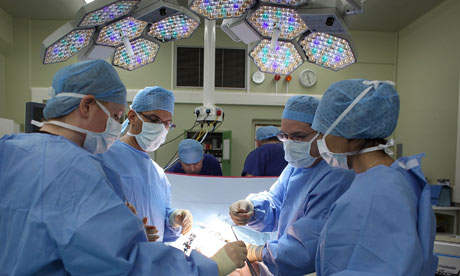 |
| A good doctor is hard to find |
Surely no other profession has seen such a sharp turnaround in its public image. After all we never really expected anything but a clutching self-interest from the City - but doctors and GPs, in particular, were like secular saints. We expected so much more. They did not merely do a job - it was a vocation to assist the sick and listen to the mildly whingey. From Scotland's Dr Findlay to Eastenders' Dr Legg, GP's were seen as a force for good and a reassuring presence in the trials of our lives.
 |
| Gillian McKeith |
According to The Observer, since 1980, average GP income has risen from £12,480 to £78,366, a 627% increase. This is comparable to the 526% rise that police officers have received over the same period and 583% that nurses have received. In the private sector a bank clerk has seen a only a 409% increase in pay. So it would appear that the critics are right to attack the flabby and overpaid public sector. That is until you note that the average CEO of a FTSE 100 company has gone up from £85,000 to £4.9 million representing an astonishing 5700% increase. Does the performance of companies warrant such a rise? At the same time only £1 in every £100 taken by the 'fat cats' goes to public sector employees.
 |
| London 2010 |
 |
| Will Hutton |
I have already addressed aspects of this issue in two previous posts* so I won't recap those arguments accept to say that even free market organisations now recognise that extreme income inequality is damaging to societies and to prospects for growth. Self -interest can be served by the vast majority of the population narrowing that gap. It is in this context that policy-makers, such as Will Hutton, are discussing the possibility of introducing a 'living wage' (£7.85 per hour) and / or capping the maximum full-time pay ratio to 20:1 in the public sector.
Many would argue that the relative rewards don't matter. After all, we have all grown much richer. The problem is that the public sector is in competition for the 'brightest and the best'. It is a market place and our doctors and top public servants had a choice about what career to pursue. I spent most of my 20s hanging out at a medical school in London. Compared to myself and the other rather uninspiring vocational students at City University, I was impressed by many of the qualities I saw.
As well as the usual medical school antics, these were highly motivated and extremely bright people. More importantly, almost all of the medics I knew had skills and interests which demonstrated how easily they could have followed other walks of life. Given the 'relatively' low wages, decreasing autonomy and constant criticism how much longer will our brightest young people see such public service as an attractive offer?
 |
| The leg bone's connected to the ... |
I think we will always have young people who will train as doctors. I just hope that it doesn't become their reserve option when the job at McDonalds falls through. Do want to go extra large with that coronary heart disease sir?
*http://canthingsonlygetbetter.blogspot.com/2010/11/this-blog-might-change-your-life.html
http://canthingsonlygetbetter.blogspot.com/2010/11/are-they-us-or-are-they-them.html

Leaving aside the vastly overpaid city bankers etc for a moment, I would agree that doctors are currently overpaid but that pay has already been eroded over the last three years & will continue to be. Doctors pay awards seem to come in fits & starts with a lag afterwards. Why do the public accept that doctors deserve more? Several reasons - most people want to avoid aspects of the job doctors do (death, smelly stuff etc)and they want doctors to have high status - salaries have become the major signal of status in our society. The status is neccesary to allow doctors to take tyhe difficult decisions they do in consensus with others including patients - when to stop treatment, for example. Money does not seem to be the best way to confer this, but there youare. Perhaps the public want to make an offering to Apollo, appease the gods of disease, and high pay to drs, as well as the odd bottle of whisky does this
ReplyDeleteAre you trying to butter me up? I really like the idea of ethical contracts. Over the years the professional standing of doctors has been eroded, and without all the hard work that was previously done with goodwill, you are left with market forces. Targets, guidelines, being able to see doctors evening and weekends all eat into the limited hours in the week and most doctors I know still work ridiculous hours. Andrew Lansley wants to hand all the political dirty work to GPs to add to the daily dirty work, and there is a good chance that there won't be many left to hand it to if the current errosion of pay and autonomy continues. Although, there will always be a cohort of us that actually quite like the job and won't strike or make a fuss and this makes our barginning position pretty weak. Oh well.
ReplyDeleteOf course he is buttering you up! He is hoping for that yacht he is after!
ReplyDeleteDoctors shouldn't have to put up with any crap from anyone. If striking is what it takes, then so be it. That is how you find out who does an important job in society. If my GP goes on strike, where will I go? The mortgage advisor? Don't think so mrs.
Teachers in Greece went on stike so much one year, the entry exams for Uni had to be done in the middle of August, because not enough of the curriculum had been delivered. Their condition of work are much better than those over here!
Every body needs a good doctor and there is no policy on this earth that would lower their worth in my eyes. And it's ok mrs G, I don't even want a yacht!